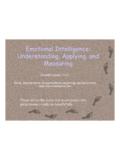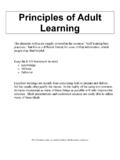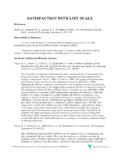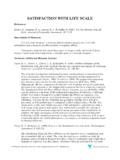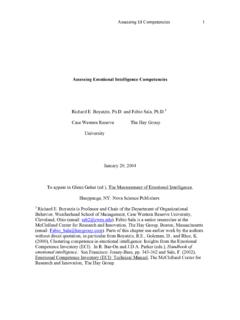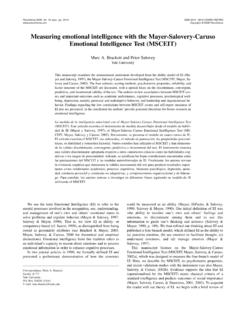Transcription of Emotional Intelligence: A Summary - Vision …
1 - 1 - Emotional intelligence : A Summary Randall Grayson, General introduction to EQ .. 2 Components of Emotional intelligence .. 6 Four Styles of Parenting ..9 Raising an Emotionally Intelligent Child.. 11 Increasing EQ areas..16 General EQ Building Principles.. 18 Interpersonal Emotional intelligence Applied to Close Relationships.. 19 2 General introduction to EQ The word intelligence did not appear in books before the twentieth century, nor did it appear in Baldwin s Dictionary of Philosophy and Psychology, which was published in 1902. As late as 1927, the majority of the best accredited books on psychology did not mention the word intelligence (Spearman, 1927). The term Emotional intelligence does not yet appear in dictionaries. Psychologists have been trying to categorize and define intelligence for many years. For the past century, intelligence has been measured with IQ, which attempts to tap one s cognitive capacity and functioning ( , one s ability to learn, recall, apply, think, reason, and abstract).
2 More specifically, IQ tests generally include a verbal IQ score based on six subtests (information comprehension, arithmetic, similarities, digit span, and vocabulary) and a performance IQ score based on five subtests (digit symbol, picture completion, block design, picture arrangement, and object assembly). The concept of Emotional intelligence brings new depth to the understanding of human intelligence ; it expands the ability to evaluate one s general or overall intelligence . Like cognitive intelligence , Emotional intelligence is difficult to define. Broadly speaking, Emotional intelligence addresses the Emotional , personal, social, and survival dimensions of intelligence , which are often more important for daily functioning than the more traditional cognitive aspects of intelligence . Emotional intelligence is concerned with understanding oneself and others, relating to people, and adapting to and coping with the immediate surroundings to be more successful in dealing with environmental demands.
3 Emotional intelligence is tactical (immediate functioning), while cognitive intelligence is strategic (long term capacity). Emotional intelligence helps to predict success because it reflects how a person applies knowledge to the immediate situation. In a way, to measure Emotional intelligence is to measure one s common sense and ability to get along in the world. A dictionary definition might include an array of noncognitive capabilities, competencies, and skills that influence one s ability to succeed in coping with environment demands and pressures. It is important to note, however, that Emotional intelligence combines with other important determinants (of one s ability to succeed in coping with environmental demands), such as biomedical predispositions and conditions, cognitive intellectual capacity, as well as the reality and limitations of the immediate and ever-changing environment.
4 Behavior is always a function of the person and the situation. Since behavior never takes place in a vacuum, but always occurs in a situational context, it is meaningless to talk about characteristics of an individual s behavior without specifying the situation in which the behavior occurs. Why do some people have better psychological well-being than others? Why are some individuals more able to succeed in life than others? These questions commanded a thorough review of factors ( Emotional skills) thought to determine general success, in addition to success in maintaining positive Emotional health. It soon became clear that the key to determining and predicting success is not cognitive intelligence alone many cognitively intelligent people flounder in life, while many less cognitively intelligent individuals succeed and prosper. During 3 these efforts to identify the most important factors involved in coping with environmental demands, no significant correlation was found between cognitive and Emotional intelligence and the examination is continuing to examine the contribution of both forms of intelligence to success in various aspects of life.
5 Daniel Goleman s book, Emotional intelligence (1995), has served to popularize this relatively new area. He has presented his adaptation of a few existing models of Emotional intelligence and emphasized how it is altered throughout life, the ways basic Emotional skills can augment one s ability to function better and to succeed in life, and the price paid for what he calls Emotional illiteracy. The genesis of the study of Emotional intelligence has its roots in David Wechsler s idea of nonintellective aspects of general intelligence , which reaches as far back as 1940 (Wechsler, 1940). The following excerpt illustrates Wechsler s foresight and recognition of the importance of Emotional intelligence : The main question is whether nonintellective, that is, affective and conative abilities, are admissible as factors of general intelligence . The contention of this paper has been that such factors are not only admissible, but necessary.
6 I have tried to show that in addition to intellective there are also definite nonintellective factors that determine intelligent behavior. If the foregoing observations are correct, it follows that we cannot expect to measure total intelligence until our tests also include some measures of the nonintellective factors (Wechlser, 1943, p. 103). In 1948, Leeper proposed that Emotional thought is part of and contributes to logical thought and intelligence in general (Leeper, 1948). These early proposals were succeeded nearly a half century later by the ideas of Harvard University s Howard Gardner, who broadened the way people have traditionally considered cognitive intelligence since the early twentieth century (Gardner, 1983). Gardner feels intelligence encompasses multiple dimensions, combining a variety of cognitive elements of Emotional intelligence (or personal intelligence , as he called it).
7 The Emotional (or personal) dimension of his concept of multiple intelligence includes two general components thus far referred to as intrapsychic capacities and interpersonal skills. Other psychologists continued to challenge the conventional view of intelligence . John Mayer at the University of New Hampshire and Peter Salovey at Yale University concentrated their research efforts on the Emotional aspect of intelligence . They expanded upon Gardner s approach and looked primarily at six components of Emotional intelligence that are very similar to the current conception of it Emotional self-awareness, assertiveness, empathy, interpersonal relationship, stress tolerance, and impulse control. 4 Why is it important? From Daniel Goleman s 1998 book Working with Emotional intelligence is about 24 points higher now than in 1918 due to better nutrition, more school, smaller family size, etc.
8 However, EQ is down compared to the last generation. Kids now are more lonely and depressed, more angry and unruly, more nervous and prone to worry, more impulsive, and more aggressive. Now, there are rising rates of despair, alienation, drug abuse, crime and violence, eating disorders, unwanted pregnancies, bullying, and dropping out of school. Predicting job performance is a favorite past time in business and psychology. When job performance is comprehensively measured according to superiors, peers, and subordinates, predicts higher performance three times better than This finding has been replicated by dozens of different experts in close to five hundred corporations, government agencies, and nonprofit organizations worldwide. Leadership is largely an Emotional intelligence . Some estimates put it as high as 90%. Leadership encompasses influence, achievement drive, self-confidence, team skills, and political awareness.
9 Failed leaders were too critical, moody, angry, defensive, and lacked empathy. All interaction can be gauged along a continuum from emotionally toxic to nourishing. Emotionally intelligent people are aware of that, and, consequently, so are the people around them. Two-thirds of workers say communication problems are the leading cause preventing them from doing their best work. Rhode Island has incorporated an Emotional intelligence curriculum for the whole state schools, hospitals, prisons, government employees, etc. From John Gottman s 1997 book Raising an Emotionally Intelligent Child From the mid 1970 s to the late 1980 s, children (as rated by parents and teachers) have become more nervous and irritable, more sulky and moody, more depressed and lonely, more impulsive and disobedient, and so on for more than 40 indicators. Impulsive girls are more likely to become pregnant by the end of their teen years and impulsive boys are at a higher risk for delinquency, violence, and using drugs and alcohol.
10 Why? Parents have less free-time with their children, less relatives in children s lives these days, and both parents often work. There is more TV watching and computer game playing. One learns EQ from a social life, which has been decreasing. High EQ kids are able to regulate their Emotional states better at soothing themselves, calm their hearts faster, have fewer infectious diseases, better at focusing attention, better at understanding people, higher academic achievement, and had better friendships with other children. High EQ children don t have the negative outcomes from divorce such as aggression, academic failure, and problems with peers. Gardner, H. (1983). Frames of mind. New York: Basic Books. Leeper, (1948). A motivational theory of emotions to replace emotions as disorganized responses.: Psychological Review, 55, 5-21. Spearman, C. (1927). The abilities of man.
